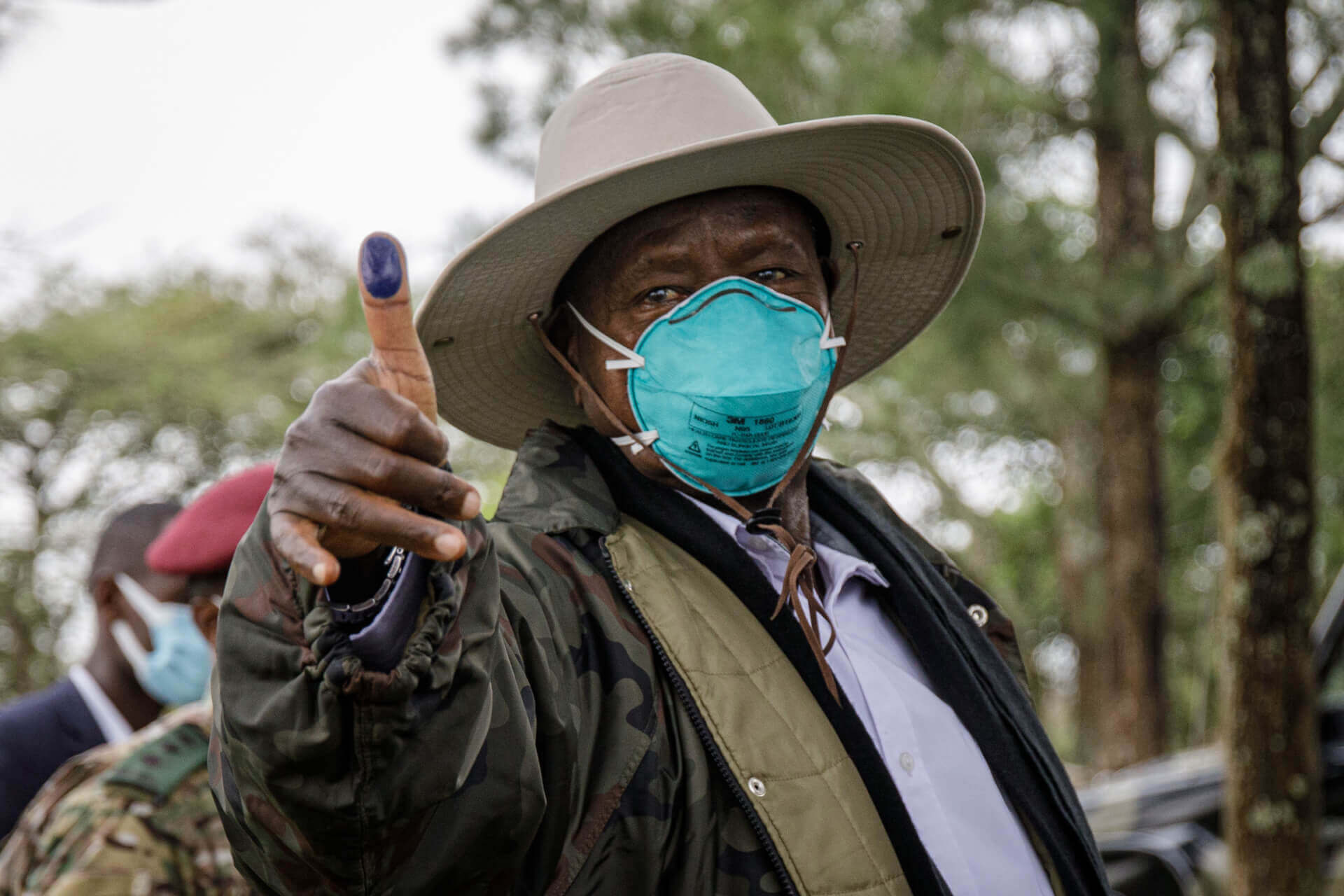Ugandan President Yoweri Museveni secured re-election and a sixth term in office, after the Electoral Commission (EC) certified his victory in the January 14 election, declaring that he had won 58.64% of the roughly 10 million votes. In comparison, his nearest challenger, Bobi Wine, won just 34.83% of the votes.
During his victory speech, the National Resistance Movement (NRM) leader pledged to revamp the country’s agriculture industry by introducing technological reforms. The National Unity Platform’s (NUP) Wine, meanwhile, said that the election was “fraudulent” and ‘rigged’ and claimed that he was in fact a “comfortable” victor, saying that he was “very confident that we defeated the dictator by far”. He also claimed that he has videos of “ballot-box stuffing”, “soldiers forcing voters to choose”, and “pre-checked ballots”.
However, the EC’s chairman, Simon Byabakama, rejected Wine’s allegations of ‘rigging’, saying, “In law we say the burden is on he who asserts to establish the facts, so the onus is on the Honourable Kyagulanyi (Wine) to prove (the allegations).”
Byabakama first drew suspicion when he only revealed the results from the whole country, without breaking it down by constituency. However, the EC chief refuted this criticism, saying, “A presidential election has only one constituency, which is the whole country.”
Wine has said that he is “under siege” and that military officers have taken control of his house and placed him under house arrest. He further reported that “heavily armed military and police have once again raided our party offices in Kampala”. Hence, he once again called for international sanctions on the Museveni administration.
The army and police, however, have dismissed his claims of a ‘house arrest’, saying that they have “just provided security in the area” and that the “police and other security agencies are around his premises…outside, not inside his home”.
The credibility of the results is sure to be debated, but what is clear is that this is Yoweri’s thinnest margin of victory ever. Furthermore, although Museveni’s NRM continues to enjoy a majority in parliament, the NUP did make significant gains and unseated several NRM lawmakers and Cabinet ministers.
The NRM, for its part, has acknowledged these losses, with Director of Information Emanuel Dombo saying, “It’s a wave and unfortunately we’ve lost a number of seats. There is nothing we can do about it,” adding, “It looks like the voters wanted change in many areas in Buganda region where this wave happened, it also happens that the president didn’t do well there.”
The election itself was marred by numerous controversies. Just last week, in the lead up to the election on Thursday, the government closed all social media applications after Facebook shut down around 50 accounts belonging to Ugandan government officials and those allied with the President. Citing a risk of foreign intervention, Museveni said, “If you want to take sides against the NRM, then that group will not operate in Uganda,” adding, “This is unfortunate but it's unavoidable. There is no way anybody can come [here] and play around with our country and decide to decide who is good [and] who is bad.” In fact, the Museveni administration employed the same tactic before the 2016 election.
And then, hours before the election, the government shut down all internet access in the country via an order by the Communications Commission chief Irene Ssewankambo. Internet has since been restored, but access to social media applications is still blocked.
All of this has painted a grim picture of the election. In fact, Wine was arrested thrice since announcing his candidacy in November. His campaign was routinely been interrupted, either through physical attacks by security forces, mass arrests of his team or his supporters, or arbitrary restrictions on where he can hold rallies.
Aside from Wine, another opposition candidate, Patrick Amuriat of the Forum for Democratic Change (FDC), has also faced severe political intimidation. Amuriat was arrested prior to the election, allegedly over a traffic violation, representing the ninth time he has been arrested.
In addition, the Ugandan government revoked the press credentials of all foreign journalists and led a well-coordinated campaign to attack and intimidate local journalists as well.
Aside from physical attacks, the ruling government has increased the roadblocks for content-sharing and news platforms to publish information by making it more difficult to obtain authorization and permits from the Uganda Communications Commission (UCC). All of this has contributed to Uganda ranking 125th out of 180 countries in the world press freedom index.
Likewise, political activists and civilians have also borne the brunt of the Museveni administration. In November, following Wine’s decision to announce his candidacy, 54 people were killed and over 800 were arrested.
Against this backdrop, it seems as though Wine’s calls for international action may be falling on deaf ears. In fact, the United Kingdom’s (UK) Minister for Africa, James Duddridge, released a statement saying, “The UK Government welcomes the relatively calm passing of the elections in Uganda and notes the re-election of H.E. Yoweri Museveni as President.” The United States (US), too, did not comment on the election beyond saying that its election observers were not granted accreditation.
All of this has paved the way for Museveni, who has been in power since 1986, to now extend his rule by another five years and further weaken Uganda’s already questionable democracy.
Ugandan President Museveni Secures Sixth Term, Opposition Leader Wine Alleges Vote Rigging
The National Unity Platform’s Bobi Wine said that the election was “fraudulent” and ‘rigged’ and claimed that he was in fact a “comfortable” victor.
January 19, 2021

SOURCE: BADRU KATUMBA / AFP
